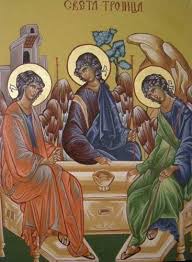
The adventure of the "Filioque" - theological implications of the procession of the Holy Spirit
First published in French in Festivals and Seasons, No 374 - "Regard sur l'Orthodoxie
In the year 800, Charlemagne was crowned emperor by Pope Leon III to fight the authority of the Emperor of the East, seeking to declare him a heretic. The western empire demanded its theologians to introduce into the Niece Creed, proclaimed in 381, a small word: " filioque " ("and of the Son"). The Creed in the west thus affirms: "I believe in the Holy Spirit, which proceeds of the Father and the Son".
This fact - which is all at the same time political and theological.
- pitted the Church of the East against the Church of West and its patriarch, the Pope of Rome. This new addition to the Creed would ruin the unity of the faith by giving Rome a unilateral capacity to make doctrinal declarations, which will no longer witness the unity of the faith of all the Christians, but focus solely on the head of one portion of the Church.
The resulting split between the Churches of the East and West, called the "Great Schism", took place between 1054. The Catholic Church states that it is the Orthodox Church which separated. The Orthodox Church asserts that it is the Latin Church which left the universal fold.
Is the presence of the " Filioque " so significant for Orthodoxy?
From the beginning the Church of the East did not accept the "filioque" formula because it modified the definition of a council of the universal Church. It is unthinkable for a local Church to alter or transform the expression of an Ecumenical Council. Dogmatic statements that are unclear or difficult to understand are not to be rejected or rewritten. Rather, they provide an invitation for a council to deepen what is attempted to be taught about God.
Orthodox Christians are also in disagreement with the Latin Church over the "filioque" because it alters the way of conceiving the relations between the persons of the Trinity.
At that time, the Westerners were very marked by the philosophy of Plato who established a relationship between our intelligence and the divine one. It was said, for example, that human love proceeds from knowledge. By this understanding, western theologians asserted that the Spirit of love proceeds of the intelligent.
Word (that is, the Spirit from the Logos or Son). The Orthodox Christians have another approach to this mystery. For them, the person of the Spirit is not subordinated to that of the Son: there is between them a mutual service. For them, the revelation of the Trinity illumines man regarding Itself and Its life by the contemplation of the Trinity. On the other hand, human attempts to reason serve only to confuse, or to oppose, or make create erroneous dependencies.
But this is not all. If Orthodox Christians make a point of affirming that the divine life proceeds of the Father, by the Son, in the Holy Spirit" --if they make a point of stressing that the person of the Spirit is not subordinated to that of the Son, but that there is between them a mutual service -- it is because that has significant consequences for the life of the Church.
For the Orthodox, if the Holy Spirit depends on the Son, Christ, it means that in the Church, it also depends on " the Vicar of Christ ", i.e. of the Pope. The Church is the continuation of Pentecost where each one has his "word" to deliver, in the Spirit, in its own language.
. The Holy Spirit rests on each believer and each believer, in communion with the others, "carries the Spirit" which makes of him a king, a priest and a prophet, in the unity of the Church. Each believer thus has his gifts or his "charisma" granted by the Holy Spirit, both the laity as well as the clergy -- lay theologians are equally illumined as clerical theologians. And the bond which links the Christian people through the bishops is not a bond of dependence or tender, but of co-operation. The multiplicity of the portions which are the Local Churches compose a symphony of which the last note, the last word, belongs to the Holy Spirit.